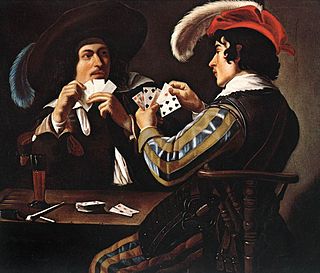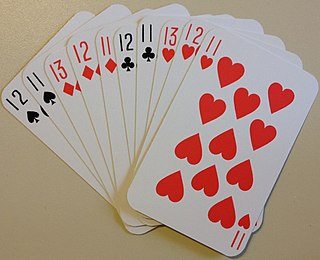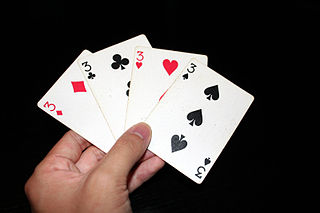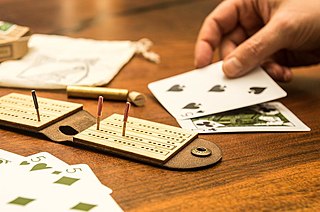Related Research Articles

Blackjack, formerly also Black Jack and Vingt-Un, is the American member of a global family of banking games known as Twenty-One, whose relatives include Pontoon and Vingt-et-Un. It is a comparing card game between one or more players and a dealer, where each player in turn competes against the dealer. Players do not compete against each other. It is played with one or more decks of 52 cards, and is the most widely played casino banking game in the world.

Contract bridge, or simply bridge, is a trick-taking card game using a standard 52-card deck. In its basic format, it is played by four players in two competing partnerships, with partners sitting opposite each other around a table. Millions of people play bridge worldwide in clubs, tournaments, online and with friends at home, making it one of the world's most popular card games, particularly among seniors. The World Bridge Federation (WBF) is the governing body for international competitive bridge, with numerous other bodies governing bridge at the regional level.

A card game is any game using playing cards as the primary device with which the game is played, be they traditional or game-specific.

Mahjong is a tile-based game that was developed in China during the Qing dynasty and has spread throughout the world since the early 20th century. It is commonly played by four players. The game and its regional variants are widely played throughout Eastern and South Eastern Asia and have also become popular in Western countries. The game has also been adapted into a widespread online entertainment. Similar to the Western card game rummy, Mahjong is a game of skill, strategy, and calculation, and it involves a degree of chance.

Sheepshead or Sheephead is an American trick-taking card game derived from Bavaria's national card game, Schafkopf. Sheepshead is most commonly played by five players, but variants exist to allow for two to eight players. There are also many other variants to the game rules, and many slang terms used with the game.

500 or five hundred, also called bid Euchre is a trick-taking game that is an extension of euchre with some ideas from bridge. For two to six players, it is most commonly played by four players in partnerships, but is sometimes recommended as a good three-player game. It arose in America before 1900 and was promoted by the United States Playing Card Company, which copyrighted and marketed the rules in 1904. 500 is a social card game and was highly popular in the United States until around 1920 when first auction bridge and then contract bridge drove it from favour. 500 continues to enjoy popularity in Ohio and Pennsylvania, where it has been taught through six generations community-wide, and in other countries: Australia, New Zealand, Canada (Quebec) and Shetland. The originator of Five Hundred, US Playing Card Company of Cincinnati, Ohio, now has headquarters across the Ohio River in Erlanger, Kentucky, west of Covington, KY. Five hundred is promoted by some as the national card game of Australia.

Gin rummy, or simply gin, is a two-player card game created in 1909 by Elwood T. Baker and his son C. Graham Baker. It is a variant of rummy.

Euchre or eucre is a trick-taking card game commonly played in Australia, Canada, New Zealand, Great Britain, and the United States. It is played with a deck of 24, 28, or 32 standard playing cards. Normally there are four players, two on each team, although there are variations for from two to nine players.

Cribbage, or crib, is a card game traditionally for two players, but commonly played with three, four or more, that involves playing and grouping cards in combinations which gain points. Cribbage has several distinctive features: the cribbage board used for score-keeping, the eponymous crib, box, or kitty —a separate hand counting for the dealer—two distinct scoring stages and a unique scoring system including points for groups of cards that total fifteen. It has been characterized as "Britain's national card game" and the only one legally playable on licensed premises without requiring local authority permission.

Big two, is a card game of Chinese origin. It is similar to the games of president, crazy eights, cheat, winner, and other shedding games. The game is very popular in East Asia and South East Asia, especially throughout China, Indonesia, Macau, Hong Kong, Malaysia, Taiwan and Singapore. It is played both casually and as a gambling game. It is usually played with two to four players, the entire deck being dealt out in either case. The objective of the game is to be the first to play of all of one's cards. It is sometimes confused with tien len ; the two games differ primarily in that big two involves poker hands, while tien len does not.

Rummy is a group of matching-card games notable for similar gameplay based on matching cards of the same rank or sequence and same suit. The basic goal in any form of rummy is to build melds which consist of sets, three or four of a kind of the same rank; or runs, three or more cards in sequence, of the same suit. If a player discards a card, making a run in the discard pile, it may not be taken up without taking all cards below the top one. The Mexican game of Conquian is considered by games scholar David Parlett to be ancestral to all rummy games, which itself is derived from a Chinese game called Khanhoo. The rummy principle of drawing and discarding with a view to melding appears in Chinese card games at least in the early 19th century, and perhaps as early as the 18th century.

Alhambra is a 2003 tile-based German-style board game designed by Dirk Henn. It was originally published in Germany by Queen Games in a language-interdependent version; an English-specific version was released in North America by the now-defunct Überplay. The game is an Arabian-themed update, set during the construction of the Alhambra palace in 14th century Granada, of the 1998 stock trading board game Stimmt So!, which in turn was an update of the 1992 mafia influence board game Al Capone; the original version was subsequently released as Alhambra: The Card Game.
Sueca is a 4 player-partnership point trick-taking card game of the Ace-Ten family, and a popular variant of the Bisca card game. The game is played in Portugal, Brazil, Angola and other Portuguese communities. Its closest relative is the very similar German game Einwerfen.

Bluke or Blook is a trick-taking card game known to parts of the East Coast and the Midwest and possibly other parts of the United States of America. The game features use of the Jokers, which are sometimes referred to as the Blukes.

Fable II Pub Games is an Xbox Live Arcade title that includes three pub game-styled minigames called Keystone, Fortune's Tower and Spinnerbox for the Xbox 360, developed by Carbonated Games under the supervision of Lionhead Studios, which all share functionality with Fable II. The games are included in both editions of Fable II. Fable II Pub Games was free for those who pre-ordered Fable II from participating retailers.
The rules here are based on those of the American Cribbage Congress and apply to two-, three- or four-player games, with details of variations being listed below.
The following is a glossary of poker terms used in the card game of poker. It supplements the glossary of card game terms. Besides the terms listed here, there are thousands of common and uncommon poker slang terms. This is not intended to be a formal dictionary; precise usage details and multiple closely related senses are omitted here in favor of concise treatment of the basics.

Three-player mahjong is a variation of mahjong for three players rather than the more common four player variations. It is not a mere adaption of four player mahjong to suit only three players but has its own rules and idiosyncrasies that place it apart from the more standard variations. The equipment used and the basic mechanisms are much like four player variations though some tiles are removed, certain plays are prohibited and the scoring system is simplified. The game is embraced in some Asian countries while ignored or snubbed in others.
Court Piece is an Iranian trick-taking card game similar to the card game whist in which eldest hand makes trumps after the first five cards have been dealt, and trick-play is typically stopped after one party has won seven tricks. A bonus is awarded if one party wins the first seven tricks, or even all tricks. The game is played by four players in two teams, but there are also adaptations for two or three players.

Watten, regionally also called Watteln or Wattlung, is a card game that is mainly played in Bavaria, Austria, Switzerland and South Tyrol. There are several main variants: Bavarian, Bohemian, South Tyrolean (Stichwatten), (Austrian) Tyrolean, Kritisch and Blind Watten. It is usually a 4-player game, which is "by far the most interesting", but it may also be played by 2 or 3 players. Parlett says that "though hard to describe, Watten is fun to play and easy to learn."